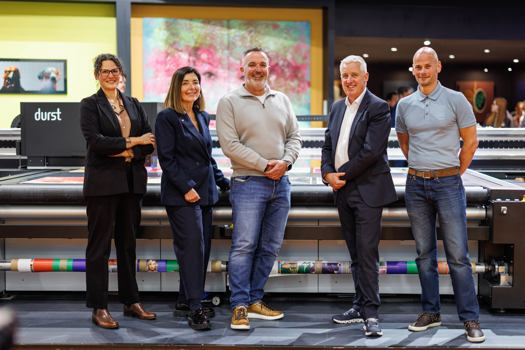Woodhead had already bought two finishing lines from Yorkshire-based Daco Solutions and was delighted with how they had performed. “They always do exactly what they say on the tin,” says Woodhead. The question was which Daco machine to go for?
The company, which prints labels for lots of independent businesses was seeing significant growth in demand for labels from small beer and wine producers, so Woodhead wanted the ability to undertake more jobs in-house for which the company could foil, as well as laminate and varnish.
The bulk of Anglia Labels’ work is high-quality, short to medium-run – 500-1,000metres – work. Customer demands have changed over time and work has gradually moved from flexo to digital. Woodhead says the company is now around 75% digital and finishes totally offline.
The changing nature of the work is why late last year the company decided to plump for a new Daco DF350SR 037 Flex, which has both semi- rotary and full-rotary die cutting, two-colour print or varnishing, slitting, laminating and cold foil with UV curing and IR drying.
Having made the decision to purchase a new machine of this ilk Woodhead says there was no point shopping around for alternatives thanks to his past experience of dealing with Daco.
“They are a very user-friendly supplier and will build something to your specification,” says Woodhead. “We had already installed two Daco finishing units: one with straightforward varnish, laminate and then a die-cut; and one to die cut only, and they suited our needs at the time. However, as we moved more and more into the beer and wine marketplace, where people wanted different embellishments, we decided to ask Daco to make a machine that would have two flexo heads on it and cold foiling as well so that we could facilitate a lot of the newer requirements we were getting from our newer customers.”
The company used to have a hot foil machine and would also outsource some smaller hot foil jobs to a local company that does nothing but hot foiling.
“Or we would be interrupting one of the two flexo machines to do cold foiling, bespoke varnishing, spot varnish and sandpaper varnish, but that interfered with production on the flexo machine, so we decided it was necessary to install a standalone finishing machine to fulfil all of these extra requirements,” says Woodhead.
He adds that he was “very, very happy” with the two existing Daco machines so the key decision for him wasn’t which equipment supplier to go with but what specifications to opt for.
“You tell them what you want, they go and build it and it doesn’t let you down,” says Woodhead.
“In comparative areas, if you look at competing devices, Daco build a very similar machine at a lot better price. So the value for money that we get each time is excellent and you have an owner [at Daco] where if anything ever goes wrong, he personally turns up and comes and looks at the electronics or the programming and he will help us out at the drop of a hat. You just don’t get that level of service from anybody else in the industry.”
That first-class level of service meant installation went extremely smoothly. “The courier turned up in the morning and they had come all the way over from Beverley. David Beynon, the owner of Daco, was already here – he’d stayed over the night before – so he came along with the electronic experts and electrical experts, wired the machine up, and it was all done and tested by six o’clock that day. We did all of the training for our four operators the next day, so it couldn’t have gone smoother. Everything was superb.”
Thanks to the machine operators’ previous exposure to Daco machines and the semi- rotary shuttling system it didn’t take them long to get up and running on the new model, which Woodhead says is really straight- forward to use.
“The only learning curve we had is the two flexo heads that are on the machine only run in full rotary mode and not semi-rotary so we had to decide what cylinders we wanted to buy and select print repeats that would suit all our finishing needs. There was a little bit of training for our guys on that, but really the rest of the machine was similar to the ones we already had,” he explains.
A recent upgrade to the mechanics and software means the Daco DF350SR has a maximum production speed of 70m per minute (229ft/min), which coupled with the ability to remove the 22in magnetic die cylinder and replace this with Daco’s standard full rotary dies, allows the die-cutting of labels to a maximum speed of up to 17m per minute (575ft/min) in register.
Daco says the machine’s servo drive technology and software allows for quick and easy setup and the print to die register can be achieved with the use of minimal substrate.
Woodhead says that to date the machine has worked out extremely well for Anglia Labels. “In terms of what David built for us, it was fairly new for him and his programmer in terms of some of the bolt-on goodies that he put on and there have been a few instances where things haven’t quite worked as we wanted them to. But when we’ve encountered any issues David has instantly come online and got his programmer to come online and they’ve sorted the issue out in hours. I just think that’s super customer service – it is absolutely second to none.”
Woodhead says one of the best things about the new machine is its running speed of between 50m to 70m a minute, which he says is “excellent” for semi-rotary die-cutting. Its reliability on cut is “also superb”. His only regret is specifying the cold foil option, whereas in retrospect he would have plumped for hot foil.
“That’s only from the point of view that more and more customers are asking us for more wine materials, where you’ve got quite a depth to the material and cold foil doesn’t get into those materials only hot foil does. In hindsight, that was the one thing perhaps I should have had changed, but in terms of what they’ve produced and how it works, it’s been excellent.”
Since installation Woodhead says the machine has helped to improve the company’s lead times and as well as its capability to spot varnish and spot print on top of digital print.
“So now I can add metallic colours, spot varnishes and sandpaper varnishes. Everything is done in-house now – we’ve stopped outsourcing and that means we’re in control of the speed that jobs goes through the company and we’re in control of our costs.”
This ability to keep on top of costs has never been more important thanks to the current economic climate and Woodhead says the company is well placed to take advantage of growing demand for labels from a wide range of relatively small independent brands producing gins, vodkas and beers. “The drinks market is quite exciting for us and it’s growing rapidly,” he adds.
If demand from these customers continues to boom Woodhead may find himself in a position where he needs to order another machine to satisfy demand. It hardly comes as a surprise to hear who he would turn to first if this need arose.
“David and the team at Daco concentrate on feedback from their customers – what’s good about a machine and what’s not so good – to help them build the next model and whenever you make a comment, he takes it on board and he amends accordingly. When you get a supplier like that you are already going to write it down in your book that the next machine you’re going to buy is going to be from him.”
SPECIFICATIONS
Max web width 350mm
Min web width 200mm
Max print width 340mm
Max web speed – full rotary 175m/min (574ft/min) dependent on material
Max web speed – semi-rotary 65m/m (213ft/min) dependent on material
Price Circa £125,000 (depending on spec)
Contact Daco Solutions 01482 860288 www.daco-solutions.com
COMPANY PROFILE
Sudbury, Suffolk-based Anglia Labels has been around for 43 years and current managing director Ian Woodhead has been with the company for 19 years. The business has a portfolio of around 700 clients – many of them are in the drinks sector – and most of the work is short to medium-run length produced on Anglia’s digital presses, which include an HP Indigo WS6800 and a Domino N610i. The company employs 20 people and has an annual turnover or circa £3m.
Why it was bought...
Anglia was outsourcing a lot of jobs or finishing them on other machines in-house which was inefficient, both in terms of time and cost.
How has it performed...
Woodhead says that since the machine was installed it has run like a dream and made the company much more efficient. “I would recommend Daco to the whole industry,” he adds. “They are a small company and you get a personal service. Our small little company relies on relationships with its suppliers and its customers and we know that we can rely on Daco, which takes a lot of our troubles away.”










